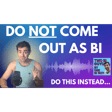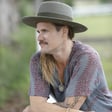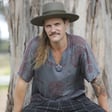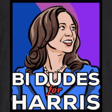Introduction to Mark Cusack and 'Fluid'
00:00:12
Speaker
Hello, everybody. Welcome to another episode of Two Bye Guys. I'm always excited for every episode, but I'm especially excited to see my friend again.
00:00:23
Speaker
he was here last season. He's back again, and he wrote a book. He is the founder of the support site, Not Defining, a space for anyone struggling with their sexuality, gender, or identity. He is an ICF certified integrative coach and LGBTQ plus mentor.
00:00:41
Speaker
He uses he or they pronouns, so I'm using he, but he also
Mark's Recent Activities and Liverpool Move
00:00:45
Speaker
uses they. And he is now the author of a new book titled Fluid, A Guide for People with Fluid Sexuality.
00:00:53
Speaker
Welcome back to Two Bye Guys, Mark Cusack. Hello. Thank you so much, Rob. And the excitement is all mine. Thank you so much for having me back. I enjoyed it so much the first time.
00:01:05
Speaker
I just had to come back and chat with you again. Good. I'm glad. I love when we have two bi guys here, two fluid guys. It's always lovely to have repeat guests. And we already know everything about you. I mean, not we we know as much as we could know from 90 minutes.
00:01:22
Speaker
So now we get to just chat and also hear a ton about your new book, which I read much of and gave an endorsement of. And it's lovely. So I'm excited to get
Discussion on 'Fluid' and Community Work
00:01:32
Speaker
into it. ah How have you been since I saw you last? What's new?
00:01:36
Speaker
Yeah, and thank you so much. I was really excited to send you a little sneak peek of our book, um being such an amazing voice you for our community. And thank you so much for taking a look and and endorsing it. I felt very honoured.
00:01:54
Speaker
um but it's been very, very busy since we last spoke. Um, not least because, uh, I've had this, uh, this new book kind of, uh, being announced, but, uh, also i have been doing lots of things, uh, working on my YouTube, uh, not defining, um, and my Instagram and, uh,
00:02:19
Speaker
building my kind of ah my community and things. um And I've also moved from Dublin, Ireland to ah Liverpool have been settling in there.
Exploration of Fluid Sexuality
00:02:30
Speaker
So um yeah, life is good.
00:02:33
Speaker
Oh, lovely. i only know Liverpool from that song. In me, Liverpool home. Do you know that song? yeah that ah We used to sing it at summer camp. Is that a song that you know of there?
00:02:46
Speaker
I actually have never heard of that song. Maybe it's like an old you know thing from American people who came from there. don't know. but Maybe. i'm I'm fresh off the boat.
00:02:58
Speaker
I'm new in Liverpool, so I have much to learn. If you come across that song, let me know. In me, Liverpool, home we speak with an accent exceedingly rare. If you want a cathedral, we've got one to spare.
00:03:12
Speaker
ah they went understead I forget all the words. In me, Liverpool, home. What summer camp did you go to, Rob? This is amazing.
00:03:23
Speaker
Camp Walt Whitman. And they never brought up that he was bisexual. They named the camp after him. and we never heard anything about his queerness until I left the camp.
00:03:37
Speaker
Anyway. Oh, wow. but they But somebody named it after him, so somebody liked him for some reason. and Somebody was bi. Somebody was bi and was invisible to me, but that's always happened.
00:03:53
Speaker
Yeah, so typical. All right. Well, cool. live Let me know if you come across that song. ah Congrats on the move and on all the stuff you're doing. ah We it as we were just talking about beforehand, we're in very similar spaces, kind of coming at it in different ways. You're more on YouTube. I'm more the podcast, but we're we're converging and learning from each other.
00:04:17
Speaker
and now we've both written books.
Journey of Writing 'Fluid'
00:04:19
Speaker
So tell us about like how this book came about and what it was like working on it. Sure. And yeah, I was, I was very pleased because of course this is the second most fabulous ah new book on the kind of topic of multisexuality, this the first being yours.
00:04:39
Speaker
you thank And um yeah it was so, so strange how it happened because, you know, as content creators, we might do a podcast, we might do YouTube, we might do this or that, but really what we're trying to do is just give visibility to our identity and our community in any way that we can when people kind of listen to us, right?
00:05:02
Speaker
And so I've done various things like very, very short form content, you know, like TikTok and Twitter and X and threads and all of that kind of stuff up to the kind of longer form content that where people can get detail.
Understanding Fluid Sexuality
00:05:17
Speaker
But I always wanted to kind of like put all of that, like everything that I know into one place.
00:05:26
Speaker
And so I was absolutely delighted to be able to write books this book and I was really really lucky that JKP publishers who are a fantastic um LGBT publisher um kind of helped me to make that happen and I wanted to write about the topic of fluid sexuality and because really there's not been guidebook written about this topic. I realized, oh my gosh, yeah it doesn't exist.
00:06:06
Speaker
And so, yeah, I was just really keen to so make it happen. Cool. I'm so glad you did. And I'm so glad we have a book like titled Fluid because you know we're we're all in on this similar mission of multi-spectrum attraction, you know pansexuality, bisexuality, queerness, fluidity. And Fluid was...
00:06:32
Speaker
a word that I connected with initially a ton, even more than the word by which I now love, but like fluid was the one that brought me in, I think. And the discussion group I started going to that allowed me to come out, which was by request, you know, it has by in the name, but the, the, um, subtitle of that discussion group was always like,
00:06:58
Speaker
um for anyone with fluid, multi-spectrum, or questioning identities. And it was so much more broad, and the fluid part of it was like, okay, I don't need to know if I'm bi specifically to start to have these conversations.
00:07:15
Speaker
Like, I know that I'm fluid. at least Like, I don't know what I am, but I know I'm that. And that led me down this road. And actually, your book and your your whole mission is a little bit like...
00:07:26
Speaker
fluid is ah thing is its own thing. Like, and so tough tell me like, what is the word fluid mean to you? And what is fluid sexuality? I'm so interested to hear that experience from you because that's really my experience as well.
00:07:43
Speaker
um And my kind of platform is called Not Defining because it's all just about the fact that I grew up being like, well, I'm a bit of this and a bit of that and maybe this one day and that the other day, but I'm not really sure and it doesn't really yeah you know have to fit in one box. So that's really fluidity, isn't it? So um I kind of spent most of time the beginning of the book, obviously just kind of like setting out like what is fluid sexuality? What do we mean when we say this?
00:08:15
Speaker
And so really it's a kind of something that is between definitions and that's kind of what makes it so tricky to to to understand.
00:08:28
Speaker
But essentially the way I see it, and of course my definition in my whole book is just one one idea about fluidity. But the way that I see it is that pretty much everyone who has attraction has some fluidity in their attraction, right?
Beyond Gender: Recognizing Fluidity
00:08:50
Speaker
Because even if you're monosexual, even if you're straight or gay or what have you, we all like different things at different times, right? We might be like tall people, small people, large people, you know, we might be romantically attracted to like one particular person at one time. And then later on in life, it kind of changes or
00:09:09
Speaker
kind of sexuality and and things changes. So we all actually are fluid in our attraction, full stop. and It's just that we've decided in society that gender is this really, really finite, important factor in attraction that we have to codify and make our identity.
00:09:32
Speaker
So if it so happens that gender is one of the things that can be quite fluid for you, among all the other things, then that's different and so we have to have a word for it because it's not really different and so fluidity for me is really i think any significant change that you feel is important to you important to you in terms of i want to communicate that um in your attraction so that might be okay
00:10:07
Speaker
I'm attracted to different genders and it changes or shifts or evolves. But it might also be types of people, you know, ah but it just really means any type of significant change or shift in your attractions.
00:10:24
Speaker
Yeah. Cool. You're really speaking my language. I mean, I know we've we've crossed paths and talked about this stuff before, but it's like, i mean, I just keep coming back to this idea that society boils down relationships based on gender. And that always ends up being how we define our sexuality and our identity. And it's like, okay, fine. Like to some extent I get it because straightness is so pervasive. it's like you
00:10:55
Speaker
But like there's so many different spectrums of things. And once you once you break the gender barrier and you realize your fluidity there, you start to notice it in all these other ways too. And straight people are doing that too. Straight people are fluid in their sexuality, maybe not related to gender, but in so many other things.
00:11:17
Speaker
And yet we never talk about that fluidity or it's accepted for other things, but not for gender. um So it's really like, it makes sense. I loved what you said that fluidity is like something that's between definitions.
00:11:33
Speaker
And when you really think about it, to me, everything is between definitions, like a word or a label or any definition is an attempt to group something so that we as humans can process it and understand it and categorize.
00:11:50
Speaker
But actually the truth of the universe is that all of those definitions are fake things we're creating to understand the world. And the truth is just, it is, it exists. It is fluid. It's always between definitions there. You can't fully ever define an experience.
00:12:10
Speaker
That's how I feel. What do you think? I mean, that is just it. That is absolutely it. We've come to the truth of the universe. We're only a little way into our chat.
00:12:20
Speaker
We figured it out. We're done. Absolutely. Good talk. Okay, What happened here?
00:12:26
Speaker
Let the record reflect. Mark and Rob found out. We cracked it. But it kind of is because you hit the nail on head. Everything in this world, everything on this earth, in this universe is a spectrum, is fluid.
00:12:42
Speaker
i our our bodies, our experiences, our personalities, our emotions, nature, trees, the sky, the earth like it's all a fluid spectrum. And so when we're talking about sexuality,
00:12:57
Speaker
it's not really sexuality. What you're actually talking about is the way you connect with another human being, right? So it's it's emotions, it's energies, it's ah physical sensations, it's like the touch of skin or the the the connection of personality or the way somebody's eye contact makes you feel in your heart or like, you know, like this is so, so, so infinitely diverse And so all of that happens on a complete, unique, magical
Misconceptions and Navigating Societal Expectations
00:13:30
Speaker
spectrum. And that's what makes human beings so fabulous. And it's why it's so exciting, right? yeah
00:13:36
Speaker
it it It just wouldn't be so wonderful without it. And so it's okay to have categories because it helps us to generally say, okay, well, I'm generally this, I'm generally that. Okay, cool, cool, cool.
00:13:48
Speaker
But the problem comes when we believe that those categories are like true and scientific and immovable because scientifically actually they're not and so that's what I work with so many people and I know you you know you you coach people as well so I'm sure you've had you know people get so so so stuck because they're like actually what's going on for me in reality in my natural biological psychological state is really fluid and diverse.
00:14:20
Speaker
There's all kinds of things going on, all of which is beautiful and wonderful. um But I feel like it's wrong because it doesn't fit in this predefined category. And that's such a tragedy because I just wish people would know that there's nothing wrong with you, you know?
00:14:40
Speaker
Yeah, that actually tracks so much with many of my clients and what we're working on is like where I'm helping them get in touch with their authentic selves and their desires and their belief system and their just their feelings.
00:14:56
Speaker
And a lot of stress can come from getting in touch with that and then realizing it doesn't fit with what with the boxes like that we think we should fit into or it doesn't fit with how people have seen me in the past or like it just doesn't fit. I think you said that. And like there's so much power in getting in touch with that, even when it doesn't fit and figuring out how to use language and how to use scientific concepts to to explain it, but also not having to do that and just letting it be what it is, even if you can't explain it, even if other people don't understand it. And ah and something I work on with lot of clients and also with like friends and family now, I kind of do a little subtle coaching without them realizing it, but is like being okay with
00:15:49
Speaker
being outside of that box, like not judging yourself for that. um You know, just feeling comfortable with the discomfort, if that makes sense.
00:16:00
Speaker
Yeah. Yeah. Absolutely. And that's what I've tried to do with the book, you know, to not only define this term, because in the LGBTQ plus spectrum, we've got lot of terms.
00:16:15
Speaker
and Right. And I talk about some of the other terms that we might use and stuff like that. But then also just really breaking down sexuality and how we understand it and helping people to actually pick apart all of those kind of maybe preconceived ideas or boxes or categories or expectations and really getting down to that thing that you said, that authenticity, and then kind of like building it up from the
Guidance on Understanding Attractions
00:16:46
Speaker
base. And so in the book, there are some kind of like exercises and I kind of guide people through so that you can actually understand
00:16:54
Speaker
what is going on in your body, your mind, in your heart, when you're attracted to someone and what is it that you actually like? And then once you know that, then how do you navigate life?
00:17:08
Speaker
How do you, communicate it to people. How do you deal with maybe some of the misunderstandings and bigotry that might come? And so I try to make it a kind of guidebook either for somebody who is fluid or thinks they're fluid, but also for anyone who would just like to understand human attraction in a broader way.
00:17:41
Speaker
Maybe in a few minutes, I'll ask you about some of those exercises because that might be helpful for people. But before we get there, like you kind of mentioned this, but I want to ask you more directly, like if gender is not and gender is important and it's a big part of this book. And obviously, well, well you can talk about that, too.
00:17:59
Speaker
But besides gender, what are some of the other spectrums of sexuality or identity that you feel are important that often get overlooked?
00:18:11
Speaker
So I think that one of the big ones is kind of degree of sexuality. So when we think about- I hoping you'd say that.
00:18:23
Speaker
um And I'm glad that you asked because of course we talk a lot about like fluid sexuality in terms of the genders or bi or multisexuality, but sexuality in itself is fluid in terms of the degree or the level of attraction that one person might feel and so we have the term obviously asexual which again lot of people think is finite a lot of people think that if you're asexual you don't like sex you don't have attraction you don't want a relationship some asexual people are like that but
00:19:02
Speaker
like anything else it's a spectrum and we have all these ideas about how you know we should have ah particular level of attraction we should want sex or we should want romantic relationships in a particular way um that society ordains and of course that's just really really fluid and really really diverse depending on who you who you meet so i i would say that i am very much fluid in my asexuality or my allosexuality the kind of opposite um because there have been times in my life when i've really really not experienced sexual attraction i almost at all and then there have been times when i really have and it kind of fluctuates so
00:19:53
Speaker
that's another type, I guess. Yeah. Cool. i I love that phrase you use degree of sexuality where you started. Cause like, I do think that is so important and such a big part of this conversation.
00:20:09
Speaker
And we talked about, asexuality last time we got more into it but it is it it is funny how like that spectrum is often labeled the asexual spectrum where asexual is the the end point of you know it's the extreme end of that and so a lot of people hear that and they go well I'm not asexual but actually like that maybe prevents you from finding your place on that spectrum and noticing how that shifts over time.
00:20:39
Speaker
And so, yeah, like maybe most of us aren't asexual, but let's talk about our degree of sexuality, right? Like that's a nice like way to think about it, an invitation to for people to explore that, even if they're not at the extreme end.
00:20:55
Speaker
And most people aren't at the extreme end of any spectrum. Exactly. Most people are not at the extreme end of any spectrum.
Exploring Fluidity Beyond Gender
00:21:05
Speaker
We'd be led to think that.
00:21:07
Speaker
Most of us are between definitions.
00:21:12
Speaker
i i Yeah, I love that. I also think for me, the the one that I think people don't talk about enough is, is you've mentioned it, like the energy and the dynamic and the power dynamics and like playing with those kinds of energies and dominance, submission, not just in terms of sex, but in terms of like personality, ah stronger personalities versus like more...
00:21:36
Speaker
ah i don't want I don't want to, I'm not sure what the other side of that spectrum is. It's not weakness. It's ah something else. and Going with more, going with the flow. so yeah yeah Gentler. yeah Yeah.
00:21:51
Speaker
Me too. Yeah, absolutely. And like, this is why, Sexuality is so fascinating. It's absolutely amazing. And everyone has these like wonderful specificities and different things that they like.
00:22:11
Speaker
And yet we just say, okay, what's your sexuality? Okay, I'm straight. Okay, I'm gay. Okay, I'm bi. What does that tell you?
00:22:21
Speaker
Like you and me identify as bi, but well, We probably know because you and me talk about it lot. We're pretty different. Right. but We're super different. And that's fabulous. Like, that's so cool. And that's so interesting. We don't need to always like, you know, say everything about our sex lives and everything.
00:22:41
Speaker
Well, I do online. Yeah, me too. What do you mean? we We do always have to share everything we do. Every sex act I have goes into directly into social media.
00:22:56
Speaker
I guess I should do only. Should I be doing only fans if this is if this is how I feel? me Okay, no. Go on. Most people aren't like us, Rob. Believe it or not.
00:23:07
Speaker
How do you mean? We're not normal. But that's the that's the thing. It just like leaves out. and I think straight people get away with this. Straight people get away with a lot. But this is the thing. It's like, oh, I'm straight.
00:23:20
Speaker
What does that mean? There are millions upon millions of straight people in this world and they're all so different. And it's like, right we don't see that diversity. And so young people growing up have these different experiences and they have these different you know feelings and they're like, oh, well, I don't know if this is right or wrong or weird or broken. And then you get people you knows right getting into difficulties.
00:23:49
Speaker
Right. I also think that's like when when you come out as bi or gay or lesbian or anything else, like then people will start asking you questions. You do a lot of reflecting. You start to look at where you are on these other spectrums.
00:24:02
Speaker
And if you're default straight, like, or, or you know, really legitimately straight, it off there's often no reason, external or internal reason to like explore all those other things. Like you just fit into this box and you...
00:24:19
Speaker
don't even necessarily think about anything else. and ah Or maybe you do, but you don't share it. And I think that can box people in. Because even if you're straight, you could be somewhere else on all these other spectrums or have a kink or have a dom sub dynamic that you prefer that's outside the norm. And it can be harder to share that or explore it.
00:24:42
Speaker
And so in some ways, being outside the straight box gives you this opportunity and power to explore all these other things that I wish you know straight straight people could explore more too.
00:24:56
Speaker
Yeah. And actually, they found in the research that has been done on fluidity, there's been kind of research that's been done on the way people identify.
00:25:07
Speaker
And then there's been research that's done on pupil dilation and stuff like that, where you know even if people identify one way, they get tested for fluidity and actually there's a lot of variance within that. It's one of my favorites that one of the things they found was that the group who was both least likely to be truthful about their identity um and also least likely to know about their identity ah was straight men because straight men would identify that way on the form
00:25:56
Speaker
And then so they would find out that actually they had a lot of fluidity and lots of different stimuli they would put in front of them and they would check their pupil dilation and other things.
00:26:09
Speaker
And so really that identity seems to be the most rigid, and not only the most rigid in terms of like people not realizing their fluidity, but also people actually kind of actively fibbing and lying about it. um yeah So yeah they say that bi people are untrustworthy and confused and it's like, well, scientific research has been done. Scientifically, it's straight men. it's yeah
00:26:43
Speaker
And on that, actually, i've I noticed you posting a little about this recently, but in a For straight men, it feels like not only are they boxed in in terms of sexuality, but in terms of masculinity also and their gender.
00:26:57
Speaker
um can you like it's up It's in your book too, the the gender spectrum and fluidity there. But I guess specifically for to straight men, like what do you think on that topic of being exploring their masculinity? Yeah.
00:27:13
Speaker
Yeah, um I think it's a really important kind of topic to talk about, particularly at the moment with stuff that's going on in in society. and I think we we kind of assume that we've got to be one way.
00:27:34
Speaker
So if we're born with a particular body, a particular set of genitals, like, that means that we have to be particular weight and we have to be attracted to a particular gender but it's never actually explained and so if you kind of find that you naturally fit inside all of those conventions then yay for you but there are so many people who don't And it's never ever explained. So what I wanted to do with this book was to actually not only talk about fluid sexuality, but to actually open up gender and sexuality and break them down and say, this is actually what we're talking about when we say straight, right? What is that, right? What is happening to you in your body
00:28:31
Speaker
in your mind, in your heart, when when you identify as man and you identify as hetero, and then you see a woman Like, what is that?
00:28:42
Speaker
And there are so many different things going on. There's the actual physical sensation of two bodies, right, which can feel nice. And certain parts of our bodies have a lot of nerve endings, for example. So, the right? So those... Which part?
00:29:02
Speaker
Okay. Rob, I'm British, I'm polite, and... yeah fingers let Certain parts. The heart, the heart drop. Yeah, yeah, yeah. That's what I was thinking, yeah. and so And so those parts of the body are going to feel nice when they come into contact.
00:29:27
Speaker
But there's so much else that's happening because as we know, people aren't actually just attracted to a physical body. gender is not just a physical trait. It's it's a whole identity, it's an energy.
00:29:45
Speaker
And so then the way that you identify, so for example, I identify as masculine and identify as a man. So the way that my body feels against the body of somebody else who might feel different, then i feel good because certain bodily traits that I have are making that person feel good and they're kind of creating that polarity. But then as well, the energy.
00:30:11
Speaker
So if I have a masculine energy, well, what is that? What is masculine? Well, it means different things to different people, but it might be, for example, somebody who is powerful and dominant and assertive and what have you.
00:30:24
Speaker
Okay, so if you meet somebody then who's maybe more gentle and soft and whatever, then those traits are going to feel good because of that polarity and you feel good, like I've got something to give, right? So like, I've got something to give this person and they've got something to give, which compliments me.
00:30:44
Speaker
So it's all about polarity in physical and kind of emotional traits. And so that doesn't really get explained to people. And so they don't really understand that Okay, I can have a physical body that might be strong, muscular, and powerful physically.
00:31:04
Speaker
But I might also have gentle traits. And I can still be attractive to someone because... because attraction is infinite. So these kind of boys and men who feel like they're kind of like stuck in this body and stuck in this expression because they feel like the two have to go together. Well, no one's explaining to them why it's not. So no wonder nobody understands.
Changing Sexuality Over Time
00:31:29
Speaker
So try to kind of like break all of that down and kind of explain it a bit so people can work out where they are on all the different spectrums. Cool.
00:31:40
Speaker
Yeah, I love that.
00:31:49
Speaker
Fluid kind of means a couple different things. Of course, it does. it be Even the definition of fluid resists definition. But um it means the space between these definitions and and the spectrum-ness. But you also mentioned at the beginning, it means that things can change over time.
00:32:08
Speaker
And I think that's often something that gets forgotten in our heteronormative culture, too, is that... we don't you know You can know how you feel now, but who knows what will be later and what was in the past. like you You have a chapter called Can Sexuality Change?
00:32:25
Speaker
Tell us, what do you think of that? and like how Why is that fluidity and changiness? Why is that important? I think it's really important because, of course, we're told in society it can't.
00:32:44
Speaker
Like most people that you speak to, you ask, you know, can your sexuality change? so be like, well, no you've got one true sexuality maybe it takes you a little while to work it out, but then it's it set for life.
00:33:02
Speaker
Even if you're bi, you know, it's kind of, this is it. Whereas the truth is, if we look at ah the research that's been done, and I go through a load of the research that's been done, that's very, very clear, ah quite striking, actually, a lot of it.
00:33:19
Speaker
and And we look also at the natural world, we look at animals, we look at our closest cousins in like the ape species and stuff like that, we see that fluidity exists.
00:33:31
Speaker
And so it's really important that people are aware of that because you have people who maybe they are in a relationship or maybe they want a relationship with one person and they go, well, if my sexuality shifts or may shift in the future, then how on earth can I have a relationship?
00:33:52
Speaker
No one's gonna love me. How am I gonna do this? you know i'm um I'm untrustworthy. yeah And so it's really important for people to understand that it is natural and so that they can be confident and find connections that work for them.
00:34:12
Speaker
So yes, really important. there's There's one more thing that is really, really tough, which is that some people are quite fluid like every day they might have changing attractions and stuff like me.
00:34:25
Speaker
um But then other people might have like one major kind of shift like in their life. And so it might happen in their forties, fifties, sixties, seventies, and they might have a family, they might have a relationship.
00:34:42
Speaker
And like that can absolutely just destroy somebody because they're, They think, well, my life is over and they can't understand it. Nobody understands it.
00:34:54
Speaker
No one's there to talk to them. And so it's really important that we send the message that, you know what, this is okay. It's natural. And you can come to understand again.
00:35:07
Speaker
That's really interesting. i almost haven't thought of it like that before because I think for me, similar to you is like, I notice changes all the time, maybe not daily, but sometimes. and And certainly over the past 10 years, like lots of little changes and lots of new exploration and losing interest in other things and you know swinging back and forth on the bi cycle in terms of gender too.
00:35:34
Speaker
But ah And like a lot of those shifts for me feel like pretty gradual, not huge. Like it's ah moving a little bit on the spec, you know, swinging a little, but I'm not going from one side to the other and an instant.
00:35:49
Speaker
And yet that is possible and something can do that. And it might only happen once in someone's life. Like, you know, I don't see that too often, but maybe that's because if that happens to someone It's difficult and they're not necessarily going to talk about it or share it so openly the way you and i share these little moves that happen all the time. So I'm glad you brought that up. That's really interesting. Do you work with any?
00:36:16
Speaker
I mean, I don't want you to share any details, but like, do you work with anyone or have you met people where that's the case where it's like this one big shift that suddenly they have to deal with? Yeah, absolutely. And that's kind of how I discovered the reality of that, because for say um I'm a bit like you. It's been fluid consistently.
00:36:35
Speaker
and But and I have worked with people um who have experienced these things um and can be absolutely... so, so, so challenging.
00:36:48
Speaker
The great thing is that I have actually got ah eight wonderful fluid people of real different kinds who have all kind of written little sections in the book. So they have shared their experience.
Diverse Contributions in 'Fluid'
00:37:04
Speaker
And so One of them is wonderful person called Mike, um who actually shared his story of having this kind of major life shift.
00:37:16
Speaker
um And he talks about how difficult it was for him. And then you've also got another wonderful person called Ima, who also came to it like really late, kind of late in life.
00:37:32
Speaker
um and now has a kind of polyamorous relationship and things. And so there's all different types of fluidity, um but yeah, absolutely. it's It's really tough if it happens suddenly. yeah Yeah.
00:37:52
Speaker
Interesting. ah You read my mind. My next question to ask you was going to be about some of your contributors. And so you mentioned some of them there. That's cool that some of what you're talking about came from their experiences.
00:38:06
Speaker
Also, um Gabriel Novo is a contributor who was a guest host of this podcast back in season three and also a guest. And Ross Victory, who's a friend of mine, who is a future guest on this podcast, I'm sure.
00:38:20
Speaker
among many others. What's something or are any few things that stick out for you that you learned from working with these contributors on the book? Oh, and yes, massive shout out to Gabriel and Ross.
00:38:36
Speaker
ah They were just so kind in sharing their unique experiences. um And it was just wonderful to have them them in in the book.
00:38:48
Speaker
and So, I'm just one person and I'm always really kind of conscious of that. And I speak to thousands of people like through my site and just like yourself and through my coaching and mentoring and stuff like that.
00:39:04
Speaker
And so I gather all of this wealth of information to add to my personal lived experience and obviously reading and researching and things. um but i really felt like i wanted to reflect different um experiences in the book um and i particularly wanted to have like a real diverse range because it is such a broad area fluidity and um to also see
00:39:35
Speaker
different types of people with different kind of intersecting identities represented. So we've got some like fabulous women identified there.
00:39:45
Speaker
Actually, if you look at the research, women tend to have a higher degree or a higher propensity to fluidity. And it's all about, um,
00:39:57
Speaker
the different hormonal changes that come with menstruation and the different types of arousal, which I won't get into, but it's amazingly fascinating. I'm just like, who like women just blow my mind and they're amazing.
00:40:12
Speaker
So we've just got so just fabulous, fabulous accounts from, from women there. They blow your mind. They blow my other things. Okay. Yeah.
00:40:27
Speaker
Sorry. You can't say blow on this. I'm a comedian now. You can't, you can't say women blow and not have me comment on that. Okay. This is a family podcast. or Well, it's not, is it?
00:40:39
Speaker
Is it? It's really not.
00:40:44
Speaker
This is the funny thing. talk about sex sexuality all day online, but I'm actually the shyest, most asexual, polite British person who can hardly say bum without blushing. So I don't know how I got into this line of work.
00:41:03
Speaker
I know. That is a funny incongruence. Yeah. I love it. I love it But there we go. But we are, fought that's the thing. We are forced, aren't we, in a way, because we're but born with these kind of different identities and things. So we have to talk about it. And it's like, well, I would love to be in a world where we didn't have to um talk about it, you know, all the time and write books and stuff. But I guess...
00:41:32
Speaker
keeps me ah keeps me out of trouble doing all this. But yeah, we've had we've got um we've got ah we've got an amazing person who is ah trans and two-spirit.
00:41:43
Speaker
And I really wanted to reflect that experience in the book because in yeah a lot of cultures, fluidity um and different kind of genders and sexualities were kind of accepted and understood kind of before colonization and things and so but it's kind of talked about in a in a way that maybe like lot of people wouldn't wouldn't understand. And so I just really wanted to um have that included. And it's it's a wonderful explanation. And then we have couples.
00:42:24
Speaker
There's a couple in there um who are also um from a ah Muslim background. So talking about kind of how that intersects and things. So we've got a real wonderful mix of people.
00:42:38
Speaker
cool. I love that. And yeah, I wish we could go more into it, but everyone needs to just buy and read your book. The link will be in the show notes. And like, in addition to all all the contributor stories are really interesting.
00:42:52
Speaker
The research you're mentioning a little bit of is really fascinating. Like, I know that we shouldn't need science to prove this stuff true, but like it is helpful for students for many people and myself included, like I grew up with this scientific background, psychology
Exercises for Self-Understanding
00:43:11
Speaker
major. I love to make it make sense in that framework. And like, we're finding that it does. And a lot of the research they're doing is confirming these things that you and I have just felt and know to be true.
00:43:23
Speaker
And so I love that. Check out the book for much more of the research and the details. And yeah, it's funny that you shy from saying bum and yet are so open about many things.
00:43:35
Speaker
its shows It also shows how, you know, you and I are doing different things, but it's all the same. Like it's it's openness, it's sharing, it's being comfortable with things. whatever it is. ah And you, you know, you don't, some people are not as open about like specific sex things and that's okay too. Just cause you're bi or fluid or whatever, or queer doesn't mean you have to be totally comfortable sharing every sex act. Like you are super vulnerable in your YouTube and your social media in in your way.
00:44:09
Speaker
And like the stuff you share is really intimate, even if it's not like saying the word dick or masturbation party the way the way I do.
00:44:22
Speaker
So thank you. we were here We need both. We need it all. Thank you for saying dick and masturbation so freely. You're welcome. It's a beautiful thing. How was that for you when you just said those words?
00:44:36
Speaker
What's going through your body as you say that? Just a lot. A lot. It was hard. Good. I'm glad I can push you a little here.
00:44:55
Speaker
What I really think would be helpful for people I want to get into is like what you mentioned, sort of these exercises to understand your own attractions and what you really like and how to navigate that once the awareness is created. So I don't know if you want to take us through an exercise or just kind of in general, tell us like, how do you approach this? How do you suggest clients or readers approach this?
00:45:23
Speaker
Yeah, absolutely. um So think the thing that I find most helpful is to kind of take away the labels because, as we said before, we're often kind of expected to have these labels, try to fit them in.
00:45:40
Speaker
So what i often invite people to do they kind of just put them to the side for a moment and we can come back to them later. and Because the labels are really, they're just a way for us to communicate to others something that might be important to us. and But if we don't actually have that connection with what it is that's important to us, then we don't know what to say.
00:46:07
Speaker
So we put them aside. And what's sometimes helpful to do is to actually take some time and to just kind of ground yourself for a moment and and think about first of all your physical body and connect with your physical body whatever shape or type your body is and think of some things that you like about your physical body that might be difficult for some people might be easy for others
00:46:38
Speaker
um Think about some good traits, some nice things about your body um and try to do it without reference to gender. It's just your body.
00:46:49
Speaker
um And then you can kind of do the same with your personality. So what kind of nice things might you have about your personality? um And so kind of just thinking about that, you can write them down whatever you like.
00:47:05
Speaker
And then the kind of second stage would be, again, without thinking about gender, think about if there was another body,
00:47:16
Speaker
near to you, like what feelings or sensations would feel nice to you? Now behave Rob. yeah if you could see If you could see what was inside my head right now, if I could project it Right, so that might be easier for some people than others to imagine.
00:47:40
Speaker
um But just thinking about the sensations, like what kind of touch, like what kind of body? Would it be like a ah strong body or would it be like a very delicate body?
00:47:51
Speaker
Would it be like kind of soft skin or would it be like kind of hairy skin or would it be like rough? Or would it, you know, just all of these things, just think about it really kind of breaking it it down, what would feel nice against your skin? And then you can kind of think about the energy or the personality that comes along with it as well.
00:48:12
Speaker
Like now you've understood your personality or your energy, like what what energy would you like close to you? Like, would it be like a warm person, a kind of a very like firm person or, you know, whatever that might be, what would make you feel good?
00:48:30
Speaker
And you can kind of just build that up. And so what you will have by the end of this is a picture of what you are actually attracted to. And so rather than thinking, what's my sexuality? Am I gay, straight, bi, whatever?
00:48:49
Speaker
That doesn't really tell you anything like we said before. By doing this, you actually have an understanding of what you're attracted to. And then instead of as well worrying about well what is my gender, well, you've got a list of things that you like about your physical presence and things that you like about your emotional presence. Like that's kind of a lot of what like gender is. So we can break this all down And then the trick is to kind of get used to that practice and then ask yourself in every moment, every day, every week, every whenever, what things would I like to be near to now in this moment?
00:49:41
Speaker
Or what do I like about the feel of my body now? today or tomorrow or tomorrow night or when I wake up in the morning or whatever. So it's connecting with your body and listening into it and asking it, what is it like? What makes it feel good now rather than forever fundamentally with certainty and no change.
Authenticity vs. Societal Pressure
00:50:06
Speaker
having that ongoing conversation with your body. And what people often find is that your body will tell you, right? Your body will tell you what it wants.
00:50:17
Speaker
It's not complicated. Yeah. Right? But it's, are we willing to actually listen in and think about it without the expectations of society, without reference to gender?
00:50:34
Speaker
And there you will find, you know, perhaps you have a person with a very strong, firm, muscular body with a deep voice and a beard, but actually they really feel like they have a very gentle, nurturing personality that would would like someone with another very strong body perhaps, but yeah who also has a very like firm and assertive, but, or whatever.
00:51:01
Speaker
And so you can break down all of those things and really get to know who you are and that might change and that's okay. So, Cool.
00:51:12
Speaker
I love all that. i have a few things that I want to reflect on. Like, amazing. And there's so much more in the book and more exercises. I loved reading those exercises that because they strip away all they strip away all the things we attach to these things and they just...
00:51:28
Speaker
are exercises designed to get in touch with yourself, whatever that is. I love when you added the now to that question, like, what do you like now? Because, you know, for example, I used to not like this, the chest hair.
00:51:41
Speaker
I used to be ashamed of it. ah And I thought that that was always how it would be. And that, like, it was just, you know, it was gross and women didn't like it. And some women told me they didn't like it.
00:51:53
Speaker
And now I love it. I embrace it. And that was it started with external validation. And then I internalized that over time. And so it it shifted. And now now I like it and we'll see what it is in the future. And that's the same with my attraction, too. I've realized, you know, what do I like now is not necessarily what it will be or what it has been.
00:52:17
Speaker
And I also think something like what you said makes me think of is like it, when I was first exploring this stuff and getting in touch with my true self and,
00:52:30
Speaker
I would think about what I liked or what I wanted or fantasized about. And my brain would immediately go to, well what does that mean? What does this mean? Does this mean I'm not straight? Does this mean I can't marry woman? Does this mean I'll be able to have kids? Does this mean my family will think this or that? Or does this mean not like I'll have to change my social?
00:52:51
Speaker
ah What does it mean? And ah i like what you're talking about is like, i don't I'm curious for your opinion, but my reflection is almost like, don't worry about what it means right now. like What it means will present itself over time.
00:53:09
Speaker
It'll just happen. But it for now, just ah be aware of what you like and who you are and what you like about yourself and other people. How do you see it? Do you see it as like, don't worry about what it means? Or is there a different way you see it?
00:53:25
Speaker
No, that is the perfect way of explaining it. And that's what I also used to worry about. And lot of people that I speak to worry about, it's like, what does it mean?
00:53:38
Speaker
And yeah, because we've got our natural self, right? Like were saying before, our natural body, it will tell us what it wants because that's what bodies do. Everybody has a body. Everybody has, it you know, emotions and everything. so So it's all natural. And the best way to be,
00:53:57
Speaker
most of the time is to just be your authentic self. That's the way your body wants to move. It wants to connect. It wants to flow. And so, and so that's really what we, we want.
00:54:12
Speaker
Um, but the meaning is about other people, right? It's about society. It's about the tribe, you know, the, the acceptance into the, uh,
00:54:24
Speaker
ah the society. And so if you are worried about the way that people are going to see you or treat you, then that's that's okay.
00:54:40
Speaker
But if that then means that you are forsaking your natural authenticity and the way that your body really is asking to be asking to be touched, asking to connect, asking to to flow, then can you're going to be unwell, you're not going to be in your best state.
00:55:01
Speaker
And so that's why i invite people to focus first on connecting with your body, have a relationship with your body, you know, get to know it.
00:55:12
Speaker
lot of people don't know their own body because they're stuck with what people think, what does society want? So do that first and then, then you can decide, okay, what is important enough to me that I want to or would like to communicate it to other people.
00:55:32
Speaker
And you don't have to. because the buck stops with you. You are you and that's who you are. But you might want to, so you can do it in different ways. And there are different words you can use.
00:55:47
Speaker
no Yeah. Interesting. Yeah. The the awareness is sort of the key and the just like, getting in touch with that for you. And you're absolutely right. You don't have to share anything and you certainly don't have to share everything.
00:56:00
Speaker
Even me, who's like super open about most things, I don't share everything. And like, that's okay. And what wherever you are on that spectrum of how much you want to share and why is cool too.
00:56:14
Speaker
Also, what you just said made me think of this. And I think it's super important is this idea of like, thinking versus knowing. like I feel like I'm an overthinker or have been in my life. I look at everything from every angle.
00:56:32
Speaker
I go over it 10 times. it's like a you know i'm I often worry about the future and that's my coping mechanism. And I'm i'm deprogramming that. I'm trying to unlearn that.
00:56:45
Speaker
Plant medicine has been really helpful for that. but it's also just like a form of meditation. i find that when I'm meditating or just getting quiet, ah it allows me to not overthink and it allows me to just know.
00:57:01
Speaker
And there are things in you that thinking can actually obscure them and that you actually know them without having to think. And sometimes you have to do something like meditate or plant medicine that consciously but like allows you to not think so much and just know and and the truth will come if you get quiet enough uh what what do you think of that that is absolutely That is absolutely it. And you know as a fellow overthinker, I think a lot of LGBT people, a lot of people particularly with less recognized identities like ours, we do overthink and it's a response to living in a world that doesn't recognize or understand
00:57:58
Speaker
what's naturally going on inside us. So when we're young, we feel, we know what our natural sensations and desires and wants and needs are.
00:58:10
Speaker
And then that gets put through the filter of Or is this normal? Will I be accepted by people? And the answer, of course, is no. And so then we have to expend such a lot of energy overthinking because we're constantly planning, constantly manicuring our you know appearance and our expression, the way that we're moving and kind of the way people see us so as not to let them see what we really are and of course it's wonderful to hear that you have been able to heal and I think a lot of what we do talking about it so much is our own kind of healing um you know so when we when we heal from that we get more confident in saying okay well this is me might be a bit different to like what society wants but it's beautiful and it's wonderful and so
00:59:06
Speaker
people who are still in unfortunately which is a lot of people that that state of fear basically fear and trauma and anxiety will will be thinking so it's like what does this mean what does this mean what does this mean what you're thinking as well What do people think of me?
00:59:27
Speaker
And it's understandable. And it's OK because we still live in that very unaccepting world. But if we can learn slowly and gradually to to listen in and to get to know at least, then we can decide if it's safe to do so, what we want to
Conclusion and Book Promotion
00:59:45
Speaker
Beautiful. Yeah. Finding that truth for yourself, step one, and then you choose what you want to do with that. And there's no rules. And, uh, I, yeah, I love, I love this conversation. I love going deeper on this stuff. And, uh,
01:00:01
Speaker
Talking about fluidity, ah it's really a lovely umbrella. in some ways, it's almost a more clear umbrella than bi umbrella, which is which is specific and cultural.
01:00:14
Speaker
And fluid is a little bit, feels very true to nature and earth and the the energy of the universe to me. um We have to end here, but I want you to stick around for a few minutes on Patreon. i a I want to see if we left anything out. I want to ask you about the dedication of your book, which is to your former self.
01:00:35
Speaker
Before we do that, any final thoughts? And also, where can people find your book? Is it already out? Yeah, just to say, i mean, i love this conversation as well. And thank you so, so much for all that you do. I mean, I said before that this podcast was one of the things that I first listened to when I was coming to understand myself. So it's ah it's wonderful, wonderful what you do.
01:01:01
Speaker
And um yeah, the book is really just for anyone who would like to understand their sexuality more. anyone who feels like they have a shifting or changing or complex or undefined sexuality.
01:01:17
Speaker
um And anybody who is an ally would like to just understand it more. So I would love to share it with you. um You can find it basically by searching Fluid by Mark Cusack and anywhere where books are sold or the major kind of online ah booksellers will have it. And then it will be out um in the UK, the States, Ireland, the Canada, Australia, New Zealand, at least on the 21st of April.
01:01:51
Speaker
um And you can buy it for yourself. So yeah I'd love to hear what you think. Awesome. Pretty sure this podcast will go out before that. So we'll put some links in the show notes. If you can search for it, you can also find it in the show notes.
01:02:07
Speaker
Pre-order it. It's lovely. I love the cover. It's really cool looking. It's a lovely addition to the bi bookshelf or the fluid queer bookshelf. It does have the bi colors, so it fits with all your other...
01:02:20
Speaker
five bucks now I love it. It's the fluid colors now. um Cool. Well, ah stick around for a minute, Mark. If you want to hear more with Mark a little bit more, come visit us on patreon.com slash Robert Brooks Cohen.
01:02:37
Speaker
Thank you all for listening. And thank you so much, Mark, for coming back on Two Bye Guys and for writing this book. It's my pleasure. Thank you so much for having me.
01:02:49
Speaker
Two Bye Guys by One Bye Guy is produced and edited by me, Robert Brooks Cohen, and it was created by me and Alex Boyd. Our new logo art is by Caitlin Weinman. Our music is by Ross Mincer. To help support this podcast, visit patreon.com slash robertbrookscohen. You'll get full video episodes, early access, and bonus content. Visit robertbrookscohen.com to learn more about my coaching, my book, and my stand-up comedy. And thanks for listening to Two Bye Guys by One Bye Guy.




















